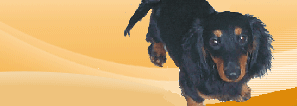|
|
|
|
Raising Your Dog - Important Steps to Take From 2 Month to 4 Months of Age
Physically, he can control himself most of the time. He prefers to do his business out of doors and he can be taken outside at frequent intervals if the weather is mild. His coat is growing fuller, but he needs protection from the rain and cold. He has learned how to bark, and may have to be discouraged from overdoing it. He may look rather leggy and out of proportion, and his longer legs will enable him to jump on chairs and sofas, so you must establish a policy and stick to it.
Housebreaking is relatively rapid now, and this is the most convenient time for adopting a puppy who is to live in a city apartment. He needs sunshine and exercise, but still lots of sleep. His principle physical preoccupation at this stage is teething, as his baby teeth fall out and permanent ones replace them.
Teething may cause him great suffering, or it may be practically unnoticeable. He may go off his feed and have to be coaxed to eat or be hand-fed. He may have diarrhea or run a fever. He will certainly want to chew everything in sight, so you should provide him with chewing toys and be prepared to find his fallen baby teeth in the most unlikely places.
He is old enough to be wormed, if necessary, and to have his annual vaccinations against hepatitis, leptospirosis, and distemper. If the weather is warm and he is outdoors a lot, he may attract fleas and other parasites, so now is as good a time as any to begin inspections for these nuisances.
Psychologically, his intelligence is wide-awake. Satisfy his curiosity by offering him varied experiences, introducing him to new places, sights, and sounds. While it is still too early for formal training, he will quickly learn the meaning of words and simple commands, and form habit patterns, both good and bad. He may become destructive while trying to learn, so he still requires supervision and patience. He wants to follow you everywhere and seems to worship you blindly. He is becoming very sociable and is especially attracted to children.
What he needs most is a healthy diet, plenty of exercise, sunshine, and rest, a regular schedule, an increased vocabulary, more freedom and space for play, a more active social life, and as many new experiences as possible under your supervision, and don't forget the love.
 |
 |
 |
 |
 |
 |
COPYRIGHT 2002 DoggiesWorld.com
|
|
|



